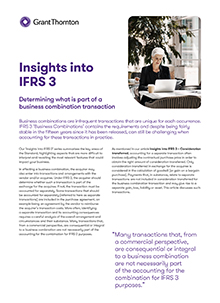
Some transactions that should be accounted for separately (referred to here as separate transactions) are included in the purchase agreement, an example being an agreement by the vendor to reimburse the acquirer’s transaction costs. More often, identifying a separate transaction and its accounting consequences requires a careful analysis of the overall arrangement and circumstances and their substance. Many transactions that, from a commercial perspective, are consequential or integral to a business combination are not necessarily part of the accounting for the combination for IFRS 3 purposes.
As mentioned in our article Insights into IFRS 3 – Consideration transferred, accounting for a separate transaction often involves adjusting the contractual purchase price in order to obtain the right amount of consideration transferred. Only consideration transferred in exchange for the acquiree is considered in the calculation of goodwill (or gain on a bargain purchase). Payments that, in substance, relate to separate transactions are not included in consideration transferred for the business combination transaction and may give rise to a separate gain, loss, liability or asset. This article discusses such transactions.
How we can help
We hope you find the information in this article helpful in giving you some insight into IFRS 3. If you would like to discuss any of the points raised, please speak to your usual Grant Thornton contact or your local member firm.


